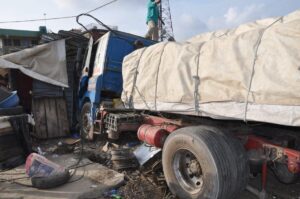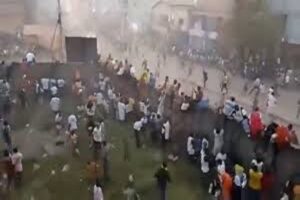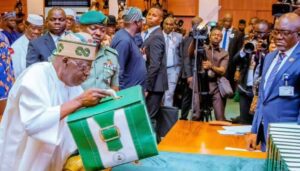
State supervised jungle justice reason for ‘unknown gunmen’— HURIWA
By Ogaga Ariemu
Civil Rights Advocacy group, Human Rights Writers Association of Nigeria (HURIWA), has blamed pervasive and intractable violations by armed security forces of rules of engagement as fundamental origin of the phenomenon of ‘unknown gunmen’ and the wanton attacks on strategic national security assets in parts of Southern Nigeria.
HURIWA spoke against the backdrops of the alleged armed invasion by Nigeria Army in Rivers community to avenge colleagues killings by hoodlums stated that in as much as there is no lawful justification for the emergence of ‘unknown gunmen’ or attacks targeting armed security operatives.
According to a statement released on Wednesday to Nigerian NewsDirect by HURIWA’s National Coordinator, Comrade Emmanuel Onwubiko, lamented that for years, soldiers and police operatives responsible for illegal executions of detainees in their facilities have often been protected officially which is a breach of the clearly established legal rules of engagement binding on the armed security forces carrying out internal security operations across the Country.
HURIWA is advocating swift changes by security chiefs and the relevant government agencies to ensure that murderers in military or police uniforms are brought to justice to pay for such despicable crimes. The Rights group said violations of the statutory rules of engagement for internal security operations should be seen as a severe crime that most be penalised because if this isn’t done and seen to have been done, those who lose loved ones may inevitably decide to take the laws into their hands and this tendency could give rise to anarchy.
HURIWA cited Section 217 (2) (c) of the 1999 Constitution and Section (8) (1) and (3) of the Armed Forces Act, Laws of the Federation of Nigeria, (LFN) 2004 as laws that ground and provide code of conduct and rules of engagement for the armed forces in internal security which are constitutional binding.
HURIWA said for instance, no officer or soldier must be found aiding or abetting any act of arson, vandalism or unprofessional conduct; and troops are duty bound to intervene in any situation to avoid a breakdown in peace, stability or law and order of an area where they are deployed.
Besides, Section 217 (2) (c) of the 1999 Constitution (as amended) provides that Nigeria’s armed forces shall suppress insurrection and act in aid of civil authority to restore order when called upon to do so by the President, Commander-in-Chief reinforced by Sect (8) (1) and (3) of the Armed Forces Act, Laws of the Federation of Nigeria, (LFN) 2004, it stressed that this presupposes that troops have to use necessary force to quell crisis resulting in deaths, injury and damages to properties.
HURIWA recalled that the principle of minimum force and proportionality must be applied at all times; whenever operational situation permits, every reasonable effort shall be made to control the situation through measures short of using force, including personal contact and negotiations; the use of lethal force shall only be resorted to if all other means to control the situation have failed or in case of unexpected attack or suspected Improvised Explosive Device (IED) attack during which a delay could lead to loss of life or serious injury to personnel; and that any force applied must be limited in its intensity and duration; it must also be commensurate with the level of threat posed.
Also, HURIWA recalled that Force shall be used only when absolutely necessary to achieve an immediate aim; the decision to open fire shall be made only on orders and under the control of on-scene commander, unless there is insufficient time to obtain such order. Fire can however be opened if the life of a soldier, any law-abiding member of the public and/or property of which it is our duty to protect is in grave danger; fire must be aimed and controlled. Indiscriminate firing is not permitted.
HURIWA continued thus, “Fire may be opened to forcefully stop any vehicle that fails to stop at a checkpoint or roadblock when ordered to stop for search; automatic fire will only be opened as a last resort; avoid collateral damage; after fire has ceased, render medical assistance and record details of incident both in writing and using audio/visual equipment whether or not casualty has been recorded; and whenever in doubt, seek clarification from higher headquarters.”
The Rights group however said regrettably, there are no empirical evidence to demonstrate the resolve of government and heads of security services to comply with these laws and to bring defaulters to face the strong arm of the laws which amounts to impunity and persistent impunity births anarchy and the phenomenon of unknown gunmen.
HURIWA recalled that landlords and residents of the Bille community, in the Degema Local Government Area of Rivers State, have reportedly abandoned their homes after soldiers invaded the community over the killing of some soldiers by suspected pirates.
HURIWA recalled that armed soldiers and police have on many occasions in the past few years in Imo State invaded communities in which armed hoodlums killed their opetatives just as the Rights group said a plethora of reports of extra-judicial execution of civilians by soldiers and police compiled by reputable groups including Amnesty International are never acted upon and those indicted are still operating within the systems if they are above the law. HURIWA said this posture must change and seen to have changed if we ever hope to sustain constitutional democracy.



